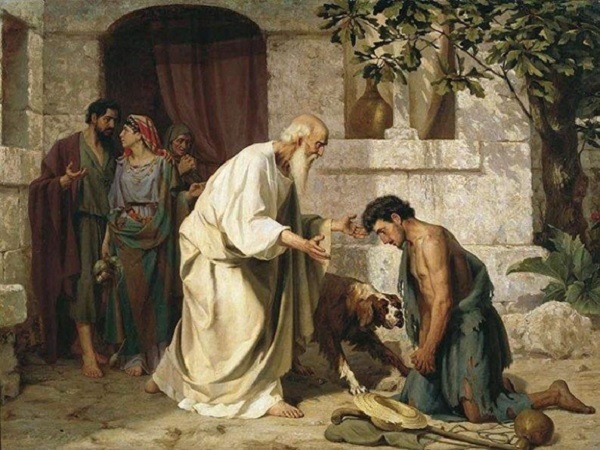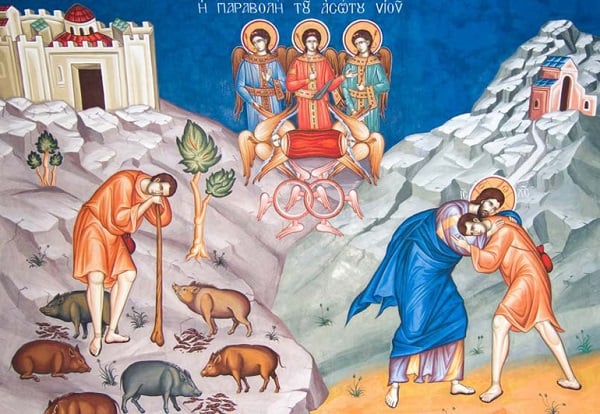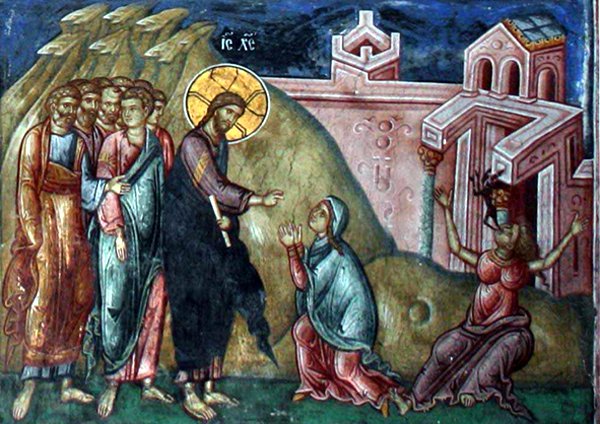A Homily for Holy Tuesday
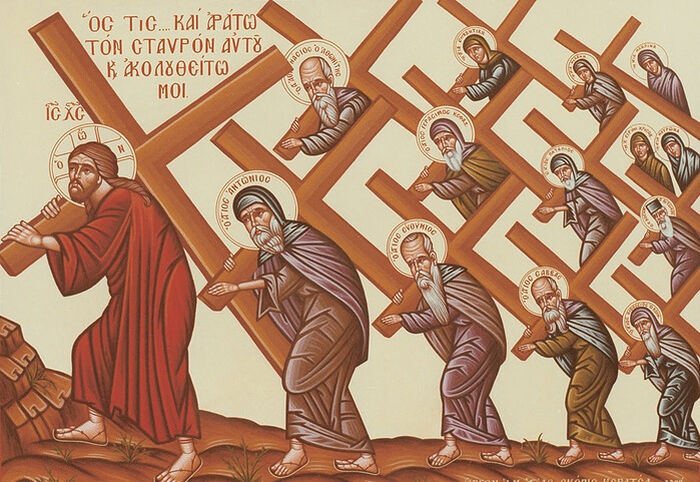 pravoslavie.ru
pravoslavie.ru
“As the Lord went to His voluntary Passion, He said to His apostles on the way: “Behold, we go up to Jerusalem, and the Son of man shall be betrayed, as it is written of Him.” Come, then, and let us also journey with Him, purified in mind; let us be crucified with Him and die for His sake to the pleasures of this life” (Holy Monday Matins, Praises).
Thus the Holy Church invites us to journey, to co-suffer and be co-crucified with the Lord on these days, dedicated to the memory of His Divine Passion and death. As obedient children, you have heeded this maternal calling and entered the indicated path that leads to the Lord. And now my task is not to persuade you to obey, but, finding comfort in your obedience, to merely wish that you complete more fully and perfectly what you have already begun.
And indeed, if any of you were to ask: “So, the Church invites us to come to the Lord Who is going to His voluntary Passion—how can we do that?” there would be nothing to respond with, except perhaps: “Do what you do, only do it properly, and you will reach the Lord.” So you fast, you go to church, and you pray at home, you lay aside worldly affairs for a time and you spend more time in solitude, you have taken up pious endeavors, devoting part of your sleep time to this—whether a lot or a little. So do this. Fasting to the point where the body feels deprived of satisfaction in food and drink, prayerful labor until the flesh is weary, cutting off usual social interactions and forcing yourself to soul-saving activities, vigilance despite the inclination to sleep, and much more associated with observing the fast constitutes the first step in following the Lord to the Crucifixion.
It is necessary only to take up this burden willingly, without self-pity. Man is attached to this earthly life. A slight reduction in food or deprivation of sleep, or more exertion and exhaustion than normal provoke an outcry of the flesh, and it feels like an attempt is being made on its life. Whoever now, despite this outcry, despite this seeming parting with life, not only does not succumb to self-pity, but on the contrary, with a desire for self-mortification, compels himself to undertake these labors—every time he does this, he takes a step in following the Lord. And it must be said that only such a man comes to Him in this regard. Is this the case with you? If so, then you’re at the goal. If not, take care to add to this labor, which you still bear, this merciless desire to mortify your flesh for the sake of the Lord. By doing this, you will offer to the Lord your love of life as a sacrifice, or you will carry your flesh to your co-crucifixion with Him, emulating at least a little of His ordeal in the Garden of Gethsemane.
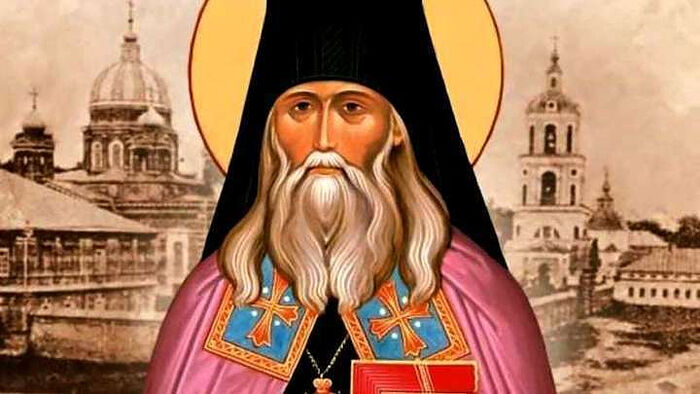 St. Theophan the Recluse. Photo: tsargrad.tv
St. Theophan the Recluse. Photo: tsargrad.tv
Having begun this way, compel yourself and move closer to the Lord in following Him. I would like to say: As you labor the flesh, so labor the soul. Although the body and soul make up one man, often, as you know, the body does one thing and the soul another. Bring your body and soul into harmony in the works you have undertaken. In fasting with the body, make the soul also fast: cut off desires, suppress the passionate movements that arise: anger, condemnation, self-aggrandizement, greed, obstinacy, and the rest. In laboring the body by standing in prayer here in church, or at home, also labor with your soul to stand reverently before the face of the Lord in your heart, paying attention to what is being sung and read. Eliminate worldly talk and isolate yourself bodily—add to this a focused mind and concentration within yourself.
If you force the body to be vigilant, you will also arouse the vigilance of the spirit or the living striving of zeal for the Lord. If you compel yourself to spiritual pursuits, also compel your soul to develop a desire for them, of which it cannot always boast. When you do this, you will bind your soul. And the soul, accustomed to moving and acting freely, feeling these bonds on itself, will begin to languish, as in captivity, and will raise a cry of discontent. But don’t slacken your self-coercion. In this way, you will become like the Lord, when He was led bound to judgment, and consequently, you will become even closer to Him in going with Him to His voluntary Passion. The labor of both body and soul is like stepping first on one foot, then on the other, and is the most successful way to follow the Lord.
Let us draw even closer. Let us stand in judgment, like the Lord. You’ve already thought to do this. I understand your fasting with the intention of communing of the Holy Mysteries of Christ. We prepare to commune worthily by cleansing our souls from all their sins in Confession. And this is what it requires: Examine your life and compare it with the Gospel commandments, take note of all that does not conform to them, acknowledge your guilt in this and condemn yourself without self-justification.Be contrite of heart and lament everything that has offended the Lord, and confess everything, concealing nothing, with the firm intention not to succumb to sinful temptations anymore. Whoever does this properly will become like the Lord, as He was led for trial and condemnation to Ananias and Caiaphas, from them to Pilate, from Pilate to Herod, and from there again to Pilate. The difference is that the Lord was unjustly condemned and maligned, but we condemn and afflict ourselves justly. But as the Lord was unjustly condemned for our justification, so our just self-condemnation will be unto our justification, through the innocent condemnation of the Lord.
Do you want, in the end, to approach the Lord Himself and go with Him to His voluntary Passion, as if step by step? Here’s what you must do: Traverse the whole path of the Lord’s Cross with deep reflection, embrace His suffering with feeling, as far as our nature can handle it, and co-suffer with Him in your heart. Begin by praying to the Lord in the Garden of Gethsemane, in anguish and agony to the point of sweating blood; go with Him, bound, over steep slopes and through ravines to the court of the high priests; remain with Him during the unjust accusations against Him, during the mockeries of scornful servants, during Peter’s denial; follow Him to Pilate, from Pilate to Herod and back again. Hear the cry of the people and the fury of those who accuse, and the unjust verdict; carry the Cross with Him to Golgotha, the Cross that is heavy enough to fall under with the noise of the blinded crowd and the taunting speeches of the triumphant elders; bear the nailing to the Cross, when nails were driven into living flesh, the raising of the Cross that tore wounds and disrupted the circulation of life, the weeping of those close by—among them the Most Pure Mother. The mockery of the foolish, the utmost humiliation to the point of saying, I thirst (Jn. 19:28), and the bowing of the head with the surrender of the spirit to the Lord. Go through all of this mentally and reproduce it more vividly within yourself, arouse sympathy for those wounds and so enter into compassion so sincerely that you yourself would suffer and accept wounds. And you will be like the women who shed tears as they followed the Lord as He carried His Cross..
Thus, step by step, you will draw nearer and near to the Lord Who is going to His voluntary Passion, and you will come to Him. Having begun with bodily labors, move from them to spiritual labors, and with both, undertake a self-examination: Lament and correct your faults in Confession, that you might worthily partake of the Mysteries of Christ. Finally, with deep reflection upon the Lord’s sufferings, enter into compassion and co-suffering with Him. But is that all? Do you not see that this path cannot end with this? This is how we follow the Lord, Who is going to His death. But we must not only follow Him, but also be co-crucified with Him. How so? When you embark upon the path of the true Christian life and truly begin to fulfill the commandments of Christ, then you will crucify yourself every moment for the sake of the Lord—that is, you will undergo the salvific co-crucifixion with Christ the Savior.
All of the above is only a preparation for this. In the sufferings of the Lord and enduring the Passion with Him, we have an impulse towards a virtuous Christian life. Spiritual and bodily labors aid us in this, and in Confession and Communion we lay its foundation and gain strength. Now having begun all this, it remains to truly begin living a Christian life. And how and why this life is a co-crucifixion with the Lord, you will understand from the beginning. You will feel for yourself, in fulfilling Christian virtues, how, now your hands and feet are nailed, now your heart is stricken, now your head is crowned with thorns, now your entire body is covered in wounds. I’m not going to explain how this is—you know it yourselves, or you’ll find out. I’ll conclude my word with a sincere wish for you. May the Lord bless you not only to exist for Him, but also to be co-crucified with Him. For there is no other path to salvation! Amen.



